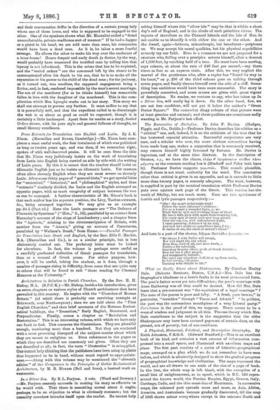The Eumenides of zEschylus. By John F. Davies. (Hodges, Figgie,
and Co., Dublin.) —Professor Davies describes his edition as a "critical" one, and, indeed, it is on the criticism of the text that he has bestowed especial attention. Successful conjectures are very rare, and a scholar who now, the more obvious corrections having been made long ago, makes a suggestion that is commonly received, may esteem himself highly favoured by fortune. Mr. Davies is ingenious, and at the same time discreet. In the description of Orestes, e.g., we have the clause, War 8' ininyipmrov mActlioss Alvee parcrvg, as the common reading has it (Dindorff and Paley both have it). Professor Davies suggests 7vIalcrrdy. This sounds plausible, though there is not much authority for the word. The annotation other than critical is given in an appendix, and as it extends to little more than twenty pages, is scarcely adequate. The want, however, is supplied in part by the metrical translation which Professor Davies pats over against each page of the Greek. This version has the merit of fidelity, but not much more. Here are two specimens of iambic and lyric passages respectively :— " Oho! the man's indubitable trail!
Follow the mute informer's evidence : For as a hound a wounded fawn, so we Track him by spilt and trickling drops of blood. My heart doth gasp with much limb-wearying toil. For every spot of earth bath now been grazed. Over the sea, too, with unfeathered flight, I came pursuing, distanced by no ship, And now he's skulking somewhere here, I wis ; It smiles at me, the smell of mortal's blood."
And here is a part of the chorus, 84oacu riaAAriaos tvvoirday :— " Re-idence I with Pallas will accept,
Nor will slight the city whore Even Zeus. lord of all, and Ares dwelt, a Fortress for celestials, Guarding Grecian altars, pr:do of Greek diviniti2e.
Now for her I offer prayer, And benignantly foretell ;
The sun's gay splendour shall draw up from earth, In fall stream, effinenoes
Teeming with delight to life."














































 Previous page
Previous page